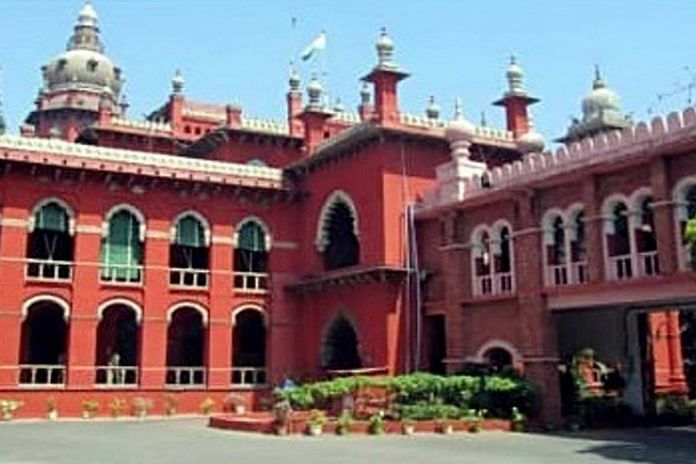New Delhi: Tribal women from communities that do not follow any custom or practice relating to inheritance would be eligible for protection under the Hindu Succession Act of 1956, the Madras High Court has held, while also underlining that prohibitions mentioned in the law regarding Scheduled Tribes (ST) were not absolute in nature.
The Hindu Succession Act lays down a comprehensive system of laws for cases relating to conditions like intestate (dying without a will), or unwilled succession, among Hindus, Buddhists, Jains, and Sikhs.
However, tribal women were considered excluded from the scope of the Act, as section 2 (2) of the Act states that the provisions will not apply to the Scheduled Tribes (as defined under the Constitution), unless the central government directs otherwise “by notification”.
In a judgment delivered last month, Justice S.M. Subramaniam used the ‘Golden Rule of Interpretation’ — a departure from the literal interpretation — to establish that tribals are not completely excluded from the Act, and the law intended to provide such communities an opportunity to adopt customs and practices.
“But in the absence of any such proof to establish that such custom or practice (relating to inheritance) existed, the Hindu Succession Act should be applied,” Subramaniam said in the verdict, while expanding the ambit of the law.
According to the court, negative interpretation (of the law), which denies tribal women equal rights, cannot be adopted and the interpretation which favours equal rights must be preferred. With this view, the court upheld a trial court order of 2017 that held that tribal women are entitled to share in family property on a par with male members.
While dismissing an appeal against the lower court order, the high court emphasised that the spirit of the provision of the 1956 Act was to give effect to the customs and practices followed by tribal communities, but in the absence of the same the provisions of the Act would apply to those from the Scheduled Tribes.
Upholding the tribal women’s right to equal share in property, the Madras High Court also directed the Tamil Nadu government to issue the required notification under Section 2 of the Hindu Succession Act, allowing application of the Act.
The ruling comes on the heels of a Supreme Court judgment passed last year, in which the apex court had directed the Centre to re-examine provisions of the Hindu Succession Act, which denied a tribal woman the right of succession to her family property. Justices M.R. Shah and Krishna Murari had noted that there was no reason to deny a tribal woman the “right of survivorship”, when a non-tribal woman was entitled to the same.
Also read: Didn’t take care of your parents in old age? For Mizos, it means losing status as legal heir
No custom or practice, must apply
In the present case, the Madras High Court was hearing a petition against a trial court verdict which had upheld the rights of two tribal women to the property of their deceased husband and father, respectively, identified in the court documents as Ramasamy. The women’s claims to Ramasamy’s property were contested by the male members of the family, who approached the high court against the trial court verdict in favour of the two women.
Apart from submitting that there was an “oral partition between parties” (which excluded the women), the male members of Ramasamy’s family had relied upon the 1956 Hindu Succession Act to contend that women from tribal communities were not covered under the law.
Upholding the trial court’s opinion, which said that Ramasamy’s wife and daughter were entitled to equal share in his property, the Madras High Court noted: “In the absence of any such custom and practice (that favours disentitlement to inheritance), which is to be proved, the courts have no option but to apply Hindu Succession Act since the parties are professing Hinduism and further there is no other reason whatsoever to deprive equal share to women on par with the male coparceners.”
Justice Subramaniam interpreted Section 2 (1) of the Act to be inclusive in nature, which did not exclude Scheduled Tribes from the application of the Act. It merely “postpones” application till the notification required is issued by the central government, allowing the application of the Act to the community, the court added.
The mere fact that the Centre had not issued such notification would not deprive tribal women of family property when there was no prevailing custom or usage between them, it added.
“Thus, Section 2(2) cannot be construed as a complete bar for invoking the provisions of the Hindu Succession Act,” Subramaniam noted, adding that it merely “paves the way” for the Centre to notify such communities.
The high court further observed that the intention of Parliament was to preserve customs and practices which are prevalent within tribal communities and not those which came out of “backwardness”. Only when the custom does not oppose public policy does the Act allow one to adopt such a provision.
Justice Subramaniam noted that the right of inheritance of tribal women was not available directly, but was recognised by a 2014 Chhattisgarh High Court decision. In this verdict, the court had noted a slew of requirements including abandonment of custom to avail benefit of the 1956 Act.
“The backwardness of tribal population in the state of Tamil Nadu is not prevailing to such an extent so as to form an opinion that the custom of such tribal community is to be adopted,” said the Madras High Court order, noting that the question of application of custom to inheritance would not apply at all in the case at hand.
(Edited by Nida Fatima Siddiqui)
Also read: From BJP leader & Hindutva activist to Madras HC judge — who is L Victoria Gowri



